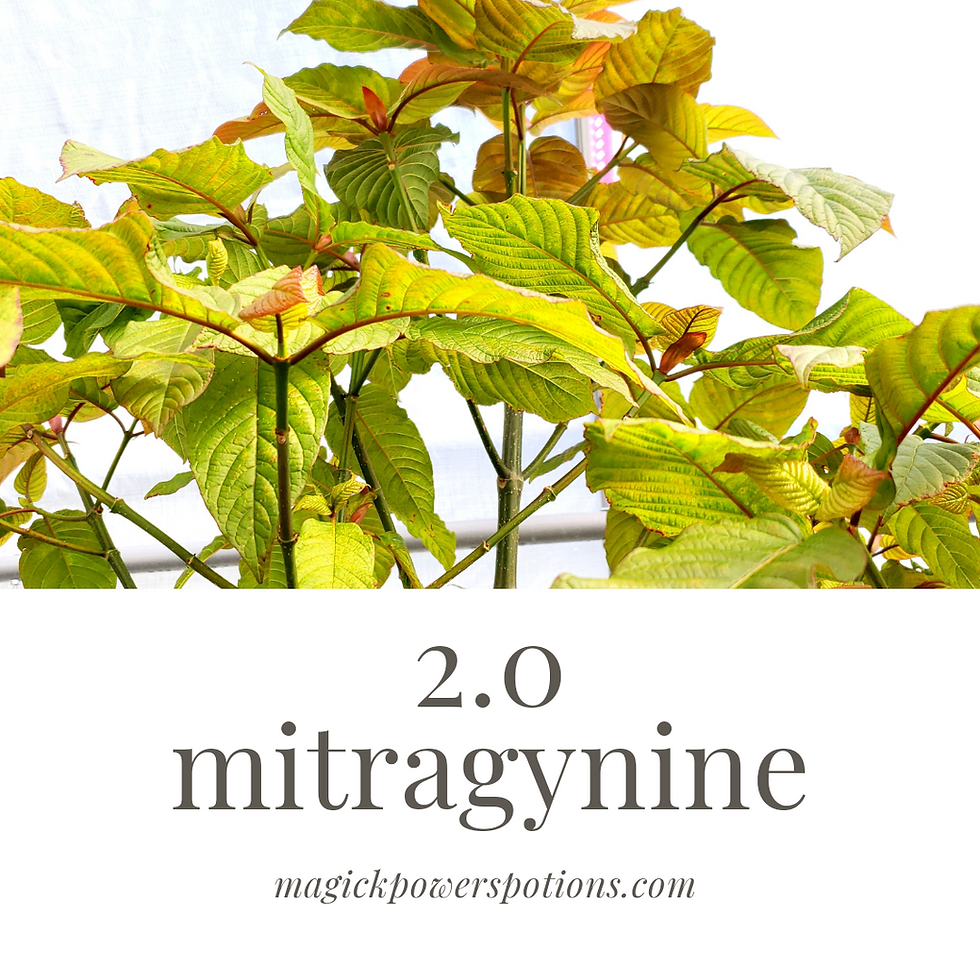2.0% mitragynine in new American kratom line
- Magick Powers

- Nov 30, 2019
- 3 min read
Updated: Jun 13, 2020
Magick Powers Potions develops genetically diverse lines of seed-sown kratom for North American agricultural applications. With mitragynine levels testing as high as 2.0% in the newest growth of domestically cultivated yearling specimens, our Borneo Rainforest line is producing high quality kratom in a non-tropical environment. We have been asked to provide our genetics to the University of Florida for further research.

It's possible to grow potent kratom in America
Samples analyzed last week at Botany Evolution, LLC, in Palm Bay, Florida, reveal mitragynine levels as high as 2.0% in the fresh uncured leaf of 14 month old seed-sown specimens from the Magick Powers Potions Borneo Rainforest line. These same trees, grown in a greenhouse set-up in coastal Oregon, tested at 1.19% mitragynine 60 days ago, indicating a significant increase in alkaloids following a complete defoliation.

The highest numbers came from the newest top growth on a yearling tree that had been completely stripped bare in September during fall harvest.
Two more domestically cultivated yearling specimens from the Borneo Rainforest line tested at 1.33% and 1.45% mitragynine. These tests were conducted on specimens from the same genetic line but grown in separate locations, suggesting a possible trend toward alkaloid potency across variable environments.

The fresh leaf samples were collected whole, filmed to preserve transparency, then sent to an independent third party lab for testing.
More samples have since been collected for further testing at another facility.
Researchers from the University of Florida have requested access to the genetics for kratom studies.

"We are looking forward to the University of Florida independently verifying the potency of our genetics," says Cornelia Llama, spokesperson for Magick Powers Potions. "We are excited to help forge the future of American kratom."
This is an exciting time for American kratom enthusiasts as interest surges in support of domestic cultivation, and myths that once deterred its development are dissipated. For years it was said that only very old kratom trees could produce beneficial alkaloids. It has also been said that kratom grown in America has no potency. With the increasing availability of kratom-specific alkaloid tests, and more people than ever cultivating it on the American continent, we are now able to call these myths into question.
What is becoming clear is that some trees are simply more potent than others.


"We've long suspected genetic links to potency," says Llama, "and this is good anecdotal evidence to suggest that such a link deserves further study."
According to Llama, researchers at the University of Florida indicated they have not been able to domestically cultivate kratom with these alkaloid readings yet. "They said plants with these alkaloid levels would open new doors for their research, so we are very excited to see what happens when they've had some time to work with these genetics. This is all new ground for us, so we're excited to help and learn whatever we can."

The origin of these particular trees, now referred to as the Magick Kalis, begins in a Maryland basement where David Winkler germinated the seeds that would eventually produce these outstanding trees. Winkler and Llama work with large quantities of genetic material to develop new lines of kratom suitable for cultivation in north America. The Borneo Rainforest line is genetically sourced from mother trees in the 140 million year old rainforest on the island of Borneo, stretching across areas of both Indonesia and Malaysia.
"For decades the American kratom landscape has more or less been composed of cuttings from a couple old clone lines," says Winkler. "Leaves from some of them produce pretty much no effect at all, and now lab tests are showing us very low alkaloid readings. We wanted to put in the work and come up with something better. This is a good sign that we're moving in the right direction."
For genetically diverse kratom specimens that can be successfully cultivated in North America, visit magickpowerspotions.com









heylo;
i bumped into this article while trying to find seed or clones etc for the kratom tree-- i am not well versed in the botanical intellect part of this bad ass tree-- but still, i am very good at growing. seems the ones in costa rica are similar ?
anyway congrats on venturing into something pure and good. i will bookmark this site and look at it time to time
good luck- safe keep pressin
o
I'm amazed why this article hasn't been commented on more. AMAZING. This kratom company is legit and not only that they are one of a kind. - Mike Garcia
Wow! Awesome!